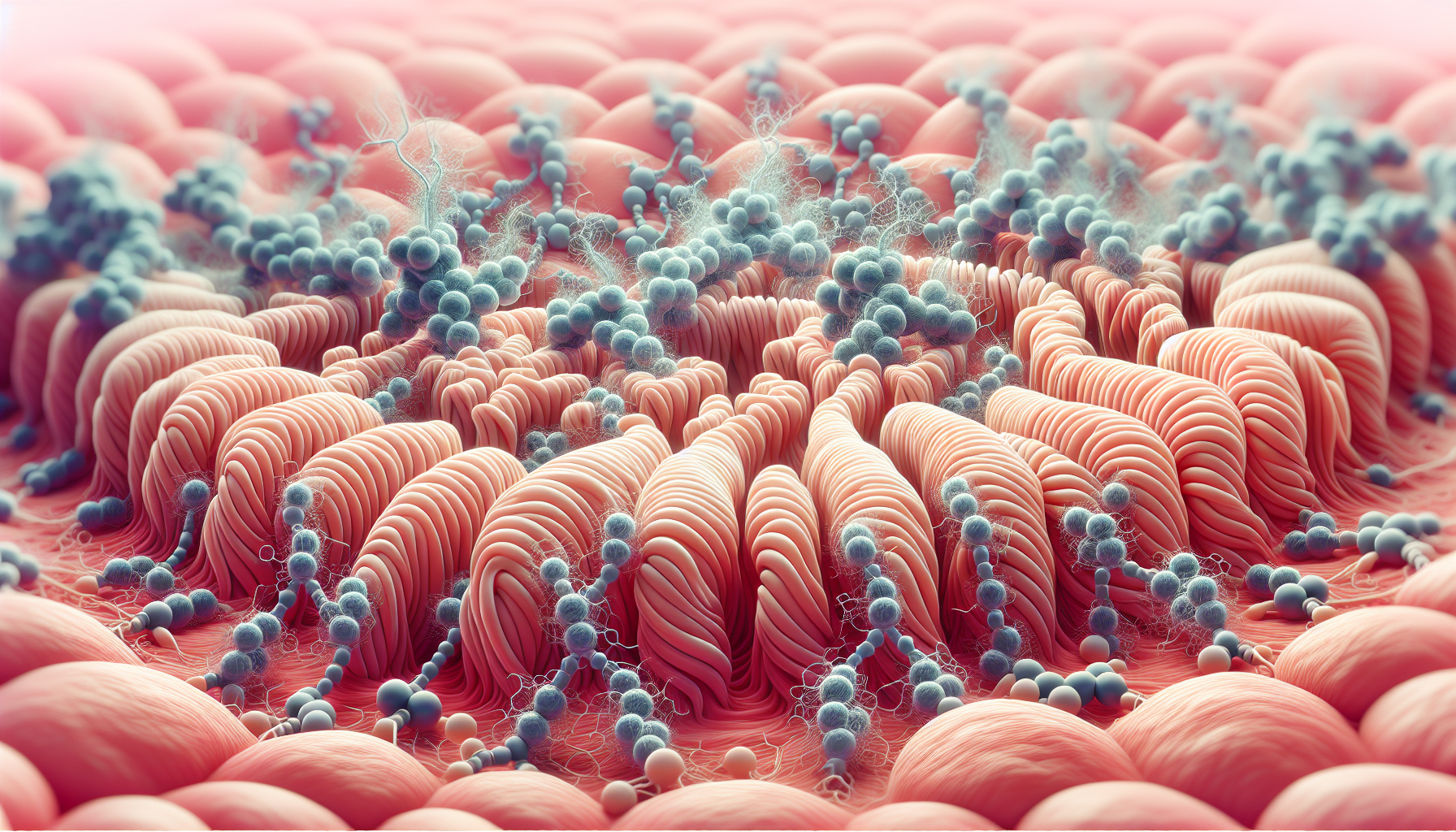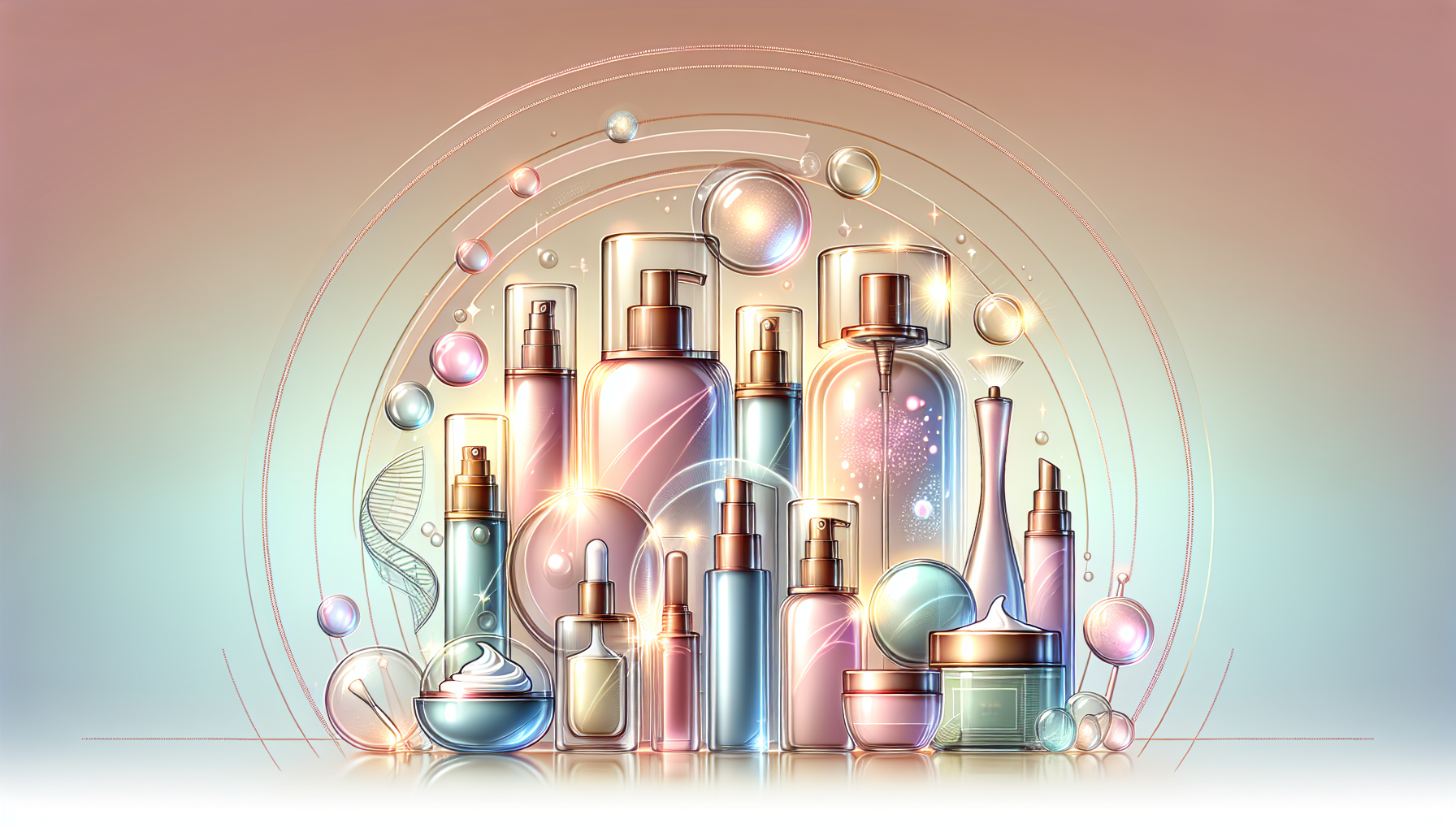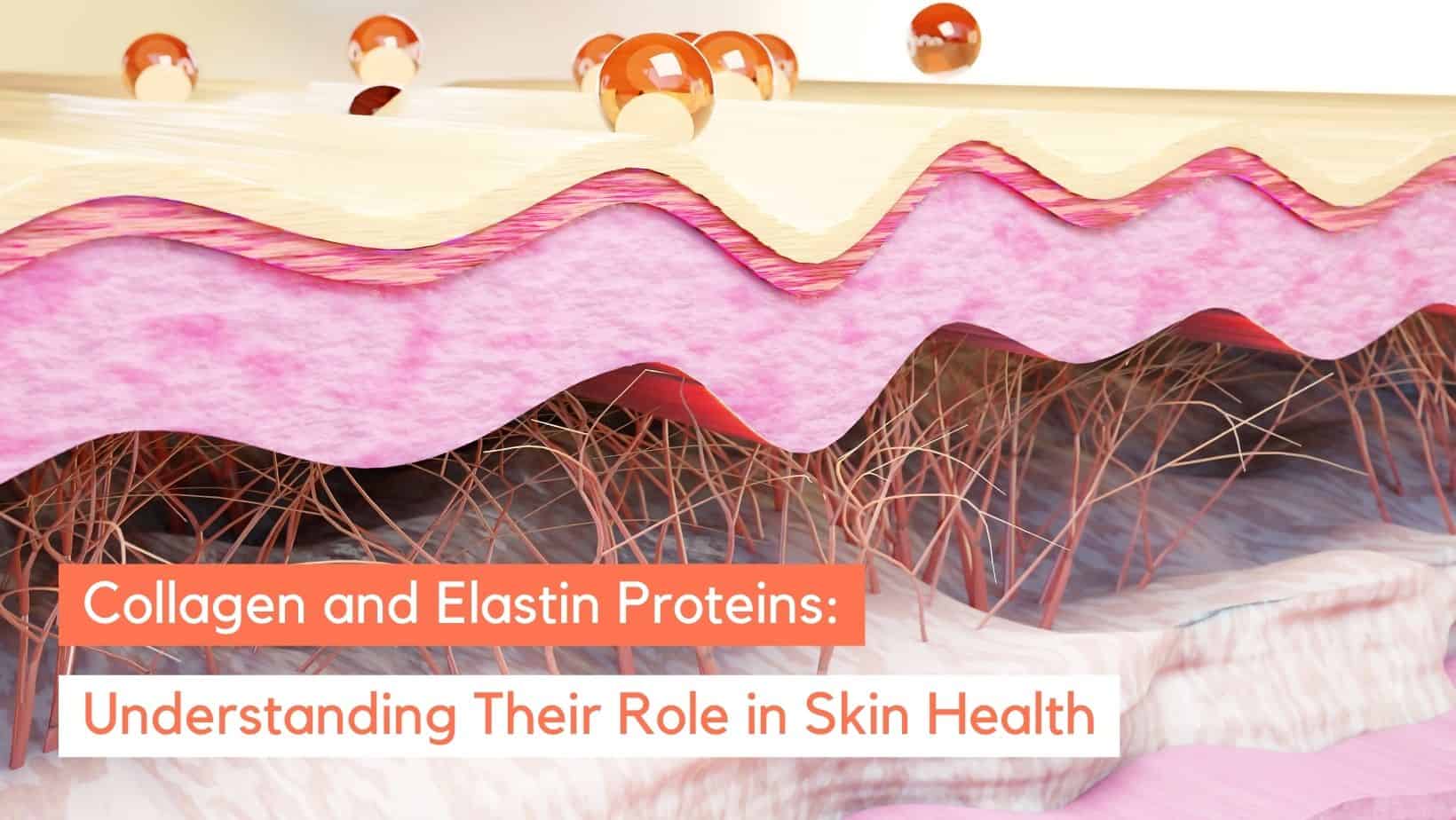Collagen and Elastin Proteins: Essential Guide for Healthy Skin
Are you curious about the secret behind youthful, radiant skin? Look no further than collagen and elastin proteins, the dynamic duo responsible for maintaining your skin’s firmness and elasticity.
These essential proteins work together to create the foundation of healthy skin. Collagen provides structure and strength, while elastin offers flexibility. But as we age, their production decreases, leading to visible signs of aging.
Imagine having the knowledge to boost your body’s production of these crucial proteins, effectively slowing down the aging process of your skin.
This guide will explore the roles of collagen and elastin proteins, their differences, and ways to enhance their production.
Read on to discover how to take control of your skin’s health and maintain a youthful appearance.
Key Takeaways
- Collagen provides structure and strength to the skin, while elastin offers elasticity and flexibility, both crucial for maintaining firm, youthful skin.
- Collagen and elastin deficiencies manifest as wrinkles, sagging skin, and various health issues, often caused by aging, sun exposure, and lifestyle factors.
- Boosting collagen and elastin production can be achieved through dietary changes, supplements, skincare products, and healthy lifestyle habits like protecting from UV rays and avoiding smoking.
What Are Collagen and Elastin?

Collagen and elastin are crucial proteins produced by fibroblasts, essential for the health of our skin and its underlying connective tissue.
Collagen acts as a supportive framework providing structure, strength, and firmness to the skin – it constitutes around 90% of the structural component within the connective tissues.
Meanwhile, elastin stands out as one of the most prevalent proteins in our body. This protein imparts elasticity, enabling bodily tissues to stretch and revert back effortlessly—this feature is particularly key for organs like blood vessels and lungs.
The elastin structure is composed of specific amino acids such as glycine, valine, alanine, and proline, which contribute to its unique properties.
By working together synergistically, collagen ensures that strength supports resilience while elastin contributes flexibility which preserves the skin’s supple appearance.
If these two vital proteins were not functioning together with their unique properties cooperating perfectly well, then our cells would eventually succumb to loss of robustness along with diminished ability for recovery – inevitably leading to wrinkles formation on over-stretched sagging skins.
Structural Differences Between Collagen and Elastin
Comprehending the distinctive structural features of collagen and elastin is essential for understanding their respective roles.
While both proteins are composed of amino acids, collagen’s structure includes proline, glycine, and hydroxyproline that contribute to its dense fibrous nature.
It stands as the human body’s most prevalent protein, with Type I playing a pivotal role in reinforcing skin, bones tendons and ligaments.
Other varieties are also crucial for bolstering joints muscles and internal organs.
Elastin, on the other hand, is constructed from tropoelastin molecules that are cross-linked into monomers, making it approximately 1,000 times stretchier than collagen.
This remarkable stretchiness allows tissues to not only expand but also return seamlessly to their original dimensions.
A significant portion of this elasticity is due to peptides derived from elastin, enriched with essential amino acids like proline, glycine, desmosine, and isodesmosine.
Proline, in particular, gives the molecule its water-repellent properties. When elastin breaks down, elastin-derived peptides (EDP) are released, which can contribute to vascular diseases and conditions such as Williams syndrome, autosomal dominant cutis laxa, and atherosclerosis.
Given these varying structures each protein fulfills divergent biological purposes: while tensile strength provision falls under collagens purview, ensuring support elastic capabilities enabling flexibility primarily come courtesy of endogenous levels.
Consequently, active bodily components like cutaneous layers of pulmonary systems all rely on an abundance for seamless stretching contraction cycles.
Functions of Collagen and Elastin in Connective Tissue
Essential to the function of connective tissues within the extracellular matrix are two key components: collagen and elastin.
Collagen provides a supportive framework for different tissues, including bones, tendons, and skin—it is this fibrous protein that maintains tissue firmness and structural support, essential for bodily strength and durability.
Contrastingly, elastin grants flexibility to these same tissues allowing them to stretch and snap back into their original shape—a critical property for the elasticity of our skin as well as organs requiring pliability such as arteries and lungs.
Elastin forms elastic fibers that endow these body parts with the resilience necessary for performance under physical stress. The synthesis of these indispensable fibers is driven by activity from the elastin gene.
Elastin degradation can lead to conditions such as atherosclerosis and the formation of blood clots.
Sources of Collagen and Elastin in the Body
Collagen and elastin are integral throughout the body, playing vital roles in its various tissues.
The primary structural elements of skin, muscles, bones, tendons, ligaments, organs, blood vessels, and intestinal linings consist of collagen fibers. They furnish these components with the essential support needed for their proper function.
Elastin forms a crucial part of elastic fiber and is abundant in tissues that must be stretchable such as skin, lungs, and blood vessels.
This protein allows these tissues to flexibly expand and return to their original shape, which is critical for their normal operation.
For example, the presence of elastin within arterial walls aids efficient heart pumping by granting arteries the ability to stretch as needed.
Signs and Causes of Deficiency
Recognizing symptoms of low collagen and elastin is crucial for keeping your skin healthy. Signs that you might have a collagen deficiency include:
- The appearance of fine lines.
- Development of wrinkles.
- Hollow areas under the eyes.
- Pain in joints and muscles.
- Increased fragility of bones.
- Diminished hair thickness.
- Delayed healing processes after injuries.
This could indicate an underlying issue with your body’s level of collagen, which may also contribute to blood clot complications.
A lack of elastin often leads to:
- Skin that appears loose or saggy
The degradation of elastin leads to saggy skin. Various conditions affect elastin, such as UV rays, cigarette smoke, and genetic disorders.
This shortfall is linked primarily to age-related declines in these protein levels, but can be exacerbated by environmental elements like harmful UV radiation from sunlight. Lifestyle choices such as dramatic weight fluctuations and insufficient intake of Vitamin C can amplify these deficits further.
How to Boost Collagen and Elastin Production
Various methods can improve the production of collagen and elastin, such as:
- Altering one’s diet.
- Utilizing supplements.
- Implementing skincare regimes.
- Making lifestyle adjustments.
Combining these strategies can yield enhanced benefits for an increased synthesis of collagen and elastin.
Dietary Changes
Ingesting foods that are conducive to the generation of collagen and elastin can be an efficient strategy for enhancing their production.
Critical for creating collagen is Vitamin C, which you can source from items such as citrus fruits, peppers, strawberries, and broccoli.
Consuming antioxidants found in blueberries, green tea, and pomegranate extract not only stimulates the production of collagen, but also shields your skin against damage caused by free radicals.
To maintain elastin health within your body:
- Consume leafy greens.
- Eat fatty fish varieties.
- Include more citrus fruits in your diet.
- Add nuts to your meals.
Adopting these nutritional habits will greatly aid in fostering both synthesis and maintenance of collagen and elastin fibers thus promoting a robustness within the skin’s structure.
Collagen Supplements
Taking collagen supplements, which are commonly found in powder or capsule variations, can markedly enhance hydration and the elasticity of the skin. These supplements undergo hydrolyzing to boost absorption into the body.
Studies have indicated that daily intake ranging from 1 to 12 grams over a period of 4-12 weeks may lead to noticeable reductions in wrinkles and dryness due to stimulation of collagen production along with other proteins integral for skin structure.
Although typically safe for most individuals, consistent daily consumption is advised for optimal outcomes when using these supplements.
Skincare Products

Choosing appropriate skincare products can enhance the production of collagen and elastin.
Utilizing sunscreen is critical to shield against UV rays that accelerate the degradation of elastin, thus aiding in preserving a more youthful and firmer skin appearance. It’s vital for keeping your skin healthy and elastic to protect it from sun exposure.
Vitamin A derivatives, known as retinoids, are especially potent at elevating skin metabolism and promoting increased production of both collagen and elastin.
Incorporating products with hyaluronic acid into your regimen can also foster an increase in collagen formation while improving the elasticity of your skin.
Lifestyle Habits
Maintaining a healthy lifestyle is crucial for keeping collagen and elastin levels intact and can even help boost them.
Applying vitamin C to the skin safeguards it from the sun’s harmful rays and prevents discoloration.
Steering clear of smoking is vital since chemicals in tobacco are detrimental to the production of collagen.
Engaging in physical activities has an indirect benefit on maintaining elastin because it boosts blood flow and metabolic processes within skin cells.
Guarding your skin against ultraviolet light exposure, as well as moderating your consumption of caffeine, will also contribute to preserving robust levels of collagen.
Conditions Affecting Collagen and Elastin
Genetic disorders and cardiovascular complications can impact collagen and elastin, which are crucial for the structural integrity of tissues.
One such genetic disorder is autosomal dominant cutis laxa (ADCL), notable for its loose skin folds that result from excessive transforming growth factor beta (TGF) signaling, potentially causing cardiovascular and pulmonary problems.
Various conditions affect elastin, such as UV rays, cigarette smoke, and genetic disorders.
Another condition related to anomalies in these proteins is supravalvular aortic stenosis (SVAS). It typically arises due to mutations in the ELN gene leading to thickening of vessel walls and reduced arterial lumen size.
Such changes increase blood pressure and strain on the heart, thereby exacerbating cardiovascular challenges.
Treatments for Collagen and Elastin-Related Conditions
There are a variety of treatments aimed at addressing issues with collagen and elastin.
Red light therapy has been known to promote growth in collagen as well as ameliorate wrinkles while bolstering skin elasticity.
On the other hand, ingesting hydrolyzed collagen supplements has shown results such as diminished wrinkles and enhanced skin moisture after three months.
Equally effective is aloe vera gel containing aloe sterols. It too can boost both hydration levels in the skin and reduce wrinkle depth over an eight-week period by encouraging increased production of collagen.
By integrating these various methods into one’s skincare regimen, it’s possible to effectively augment both elastin and collage synthesis within your complexion for healthier-looking outcomes.
Interesting Facts About Collagen and Elastin
It’s fascinating to learn that elastin possesses an astonishing capacity for stretching, being about 1,000 times more elastic than collagen.
Such remarkable stretchability enables skin and similar tissues to recover their shape post-stretching.
Despite constituting a mere fraction of the dermis, elastin fibers are crucial in preserving the flexibility and robustness of the skin.
Summary
In summary, collagen and elastin are vital proteins that play essential roles in maintaining healthy, youthful skin.
Collagen provides structure and support, while elastin offers flexibility and elasticity. Understanding their functions, sources, and how to boost their production can help you maintain vibrant skin.
By incorporating dietary changes, using the right supplements and skincare products, and adopting healthy lifestyle habits, you can enhance collagen and elastin levels.
Stay informed, take proactive steps, and enjoy the benefits of healthy, resilient skin.
Frequently Asked Questions
What are the main functions of collagen and elastin in the skin?
Elastin grants the skin its ability to flex and revert back to its initial form, whereas collagen imparts firmness, stability, and structural assistance to the skin.
How can I boost collagen and elastin production?
Emphasize the inclusion of dietary modifications, nutritional supplements, appropriate skincare items, and positive lifestyle practices to stimulate the production of collagen and elastin.
For improved skin health, begin integrating these elements into your daily regimen.
What are common signs of collagen and elastin deficiency?
Important indicators of a deficiency in collagen and elastin to be mindful of are the appearance of the following:
- fine lines,
- wrinkles,
- skin that sags,
- delayed healing from injuries,
- and pain within the joints.
These signs should be closely monitored in both your skin and body.
Are collagen supplements effective?
Indeed, taking collagen supplements has been shown to enhance skin hydration and elasticity while also diminishing wrinkles, and they are typically well-received without causing adverse effects.
What conditions affect collagen and elastin?
Various health issues can arise from altered levels of collagen and elastin, which are associated with conditions such as autosomal dominant cutis laxa (ADCL) and supravalvular aortic stenosis (SVAS).



Comments